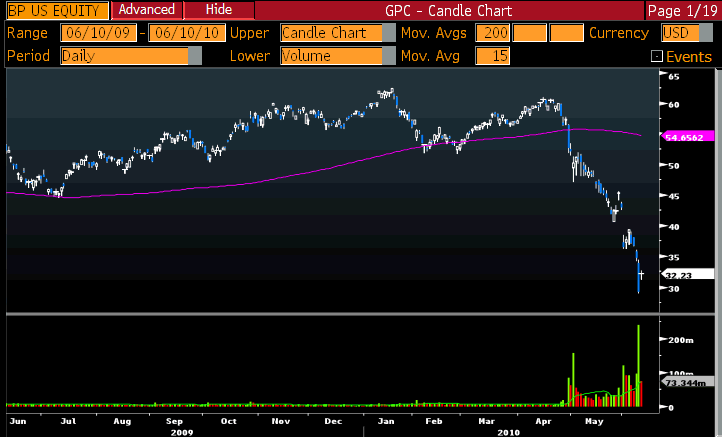
The single most common emailed question I’ve gotten — from readers, from clients, from the media — is “Do you buy BP? If so, when, where and how?”
Before we proceed, please understand what my thought process is: I want us to consider, weigh and try to determine what the possible risks are versus the potential reward is in this stock.
I suggest those of you who are considering buying or selling BP think about the following ten issues:
1) BP’s Stock is in Freefall: As the nearby chart shows, BP is down more than 50% from recent highs. Its 200 day moving average is up ~45% from current prices — near 55. Click Chart for larger BP Chart.
The current market cap is about $100B, almost 40% below its Enterprise Value of $141.65B.
When making a trade in a stock like this, you want to do more than merely hope for a binary outcome – i.e., Make money or Lose money. The goal is to understand what the risks and rewards are, predetermine the losses/downside, and put ion the best risk/reward you can.
There is intelligent speculation and outright gambling. If this trade fits your profile, aim to do the former and avoid the latter.
Research project: In distressed companies, at what levels have we seen ideal entries — in terms of price off of highs, below enterprise value, percentages below 50 and 200 day MA, dividend yields, and P/E ?
2) Is this a Trade, or an Investment? : There are different rules for Trading than Investing. Before you step into a name in distress, be sure to understand exactly what your goals are, your risk tolerances, and your time horizon.
My guess is the vast majority of the huge volume spike in BP are stat arbitrage (between the common stock and bonds, there are apparently no convertibles) and a mix of day traders and hedgies. If you plan on making BP a long term investment, then you should be thinking in terms of a longer holding period — years, not months.
A universal rule: Never allow a trade to become an investment.
….read 3-10 HERE

